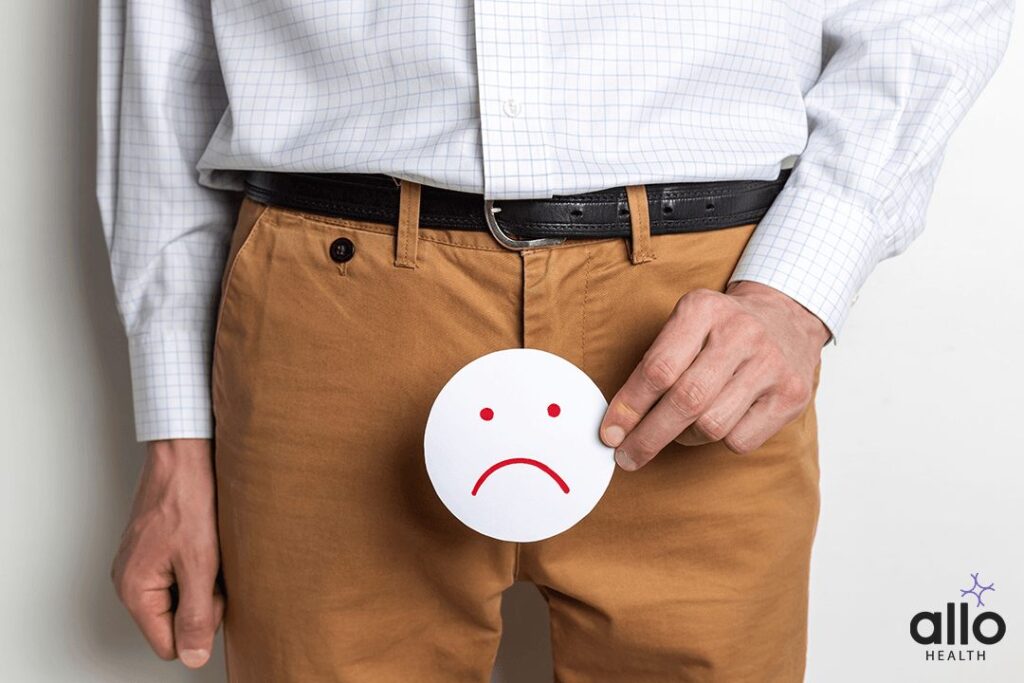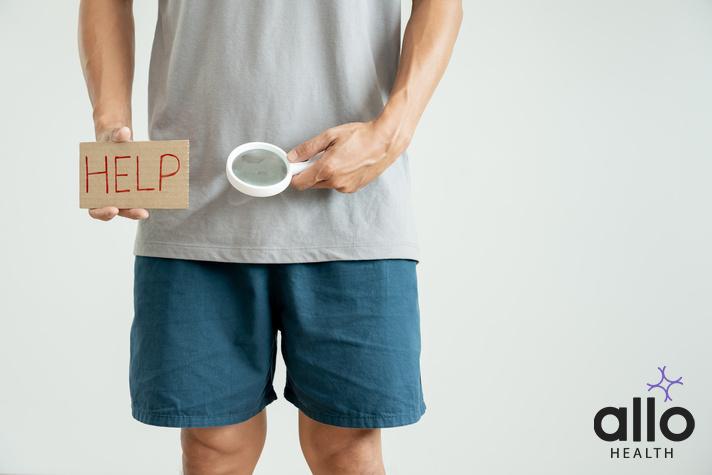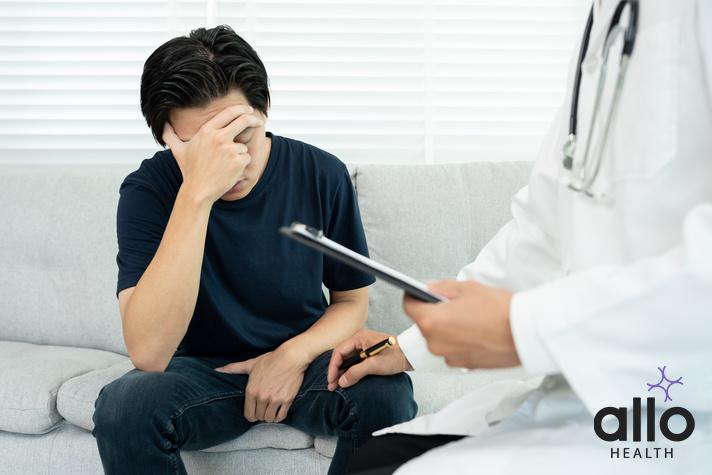Does UTI Cause Premature Ejaculation?

"The following blog article provides general information and insights on various topics. However, it is important to note that the information presented is not intended as professional advice in any specific field or area. The content of this blog is for general educational and informational purposes only.
Book consultation
The content should not be interpreted as endorsement, recommendation, or guarantee of any product, service, or information mentioned. Readers are solely responsible for the decisions and actions they take based on the information provided in this blog. It is essential to exercise individual judgment, critical thinking, and personal responsibility when applying or implementing any information or suggestions discussed in the blog."
Urinary tract infection (UTI) and premature ejaculation (PE) are two common health concerns that can significantly affect a person’s quality of life and sexual health. While they may seem unrelated, some individuals wonder whether there is a link between UTIs and PE. In this article, we will delve into this topic, exploring the potential connections and providing valuable information on prevention and treatment.
What is UTI?
A urinary tract infection (UTI) is a common bacterial infection that occurs when harmful bacteria, typically Escherichia coli (E. Coli), enter the urinary tract and multiply, leading to an infection.
- Symptoms: Common symptoms of a UTI include frequent urination, a burning sensation during urination, strong urges to urinate, cloudy or bloody urine, and discomfort or pain in the lower abdomen or back.
- Types: UTIs can be categorized based on their location, such as cystitis (bladder infection) or pyelonephritis (kidney infection). Lower UTIs affect the bladder and urethra, while upper UTIs involve the kidneys.
- Causes: UTIs often result from the bacteria from the gastrointestinal tract entering the urinary system through the urethra. Factors like sexual activity, dehydration, and urinary retention can increase the risk.
- Treatment: UTIs are typically treated with antibiotics prescribed by a medical professional. It’s crucial to complete the entire course of antibiotics to ensure the infection is fully eradicated.
- Prevention: Staying hydrated, practicing good hygiene, urinating before and after sexual activity, and wiping from front to back can help reduce the risk of UTIs.
UTIs are a common and treatable medical condition, but if left untreated, they can lead to more severe complications, making early recognition and management essential.
Effects of UTI on Sexual Health
Urinary tract infections (UTIs) can have a significant impact on sexual health, potentially leading to various concerns that affect both physical and mental well-being.
- Painful Urination: UTIs often cause painful urination, which can create discomfort and anxiety during sexual activity. This can lead to a decline in sexual desire and function.
- Frequent Urination: Frequent urges to urinate, another common UTI symptom, can disrupt the flow of sexual activity and lead to embarrassment, affecting the quality of sexual relationships.
- Performance Anxiety: The discomfort and pain associated with UTIs may result in performance anxiety. Individuals may worry about experiencing pain during intercourse, leading to difficulties in maintaining an erection and contributing to premature ejaculation.
- Urinary Incontinence: In severe cases, UTIs can cause urinary incontinence, which can be distressing during intimate moments, causing embarrassment and affecting one’s self-esteem.
- Psychological Impact: The mental stress associated with UTIs, coupled with concerns about sexual health and functioning, can lead to psychological distress and decreased sexual satisfaction.
- Relationship Strain: UTIs can strain relationships due to reduced sexual activity, discomfort, and emotional distress, emphasizing the importance of open communication and support from partners.
UTIs can have a multifaceted impact on sexual health, ranging from physical discomfort and performance concerns to psychological stress and strained relationships. Addressing UTIs promptly through medical treatments and preventative measures is essential to maintain a healthy and fulfilling sex life while mitigating these potential challenges.
What is Premature Ejaculation?

Premature ejaculation (PE) is a common sexual dysfunction characterized by a man ejaculating earlier than desired during sexual activity, often within a minute of penetration. Here are the key points regarding PE:
Symptoms:
- Rapid ejaculation within a minute of penis penetration.
- Lack of control over ejaculation.
- Distress or frustration due to the inability to satisfy a partner.
Causes:
- Psychological factors like anxiety, stress, or performance pressure can contribute to PE.
- Biological factors, such as abnormal hormone levels or neurotransmitter imbalances, may play a role.
- Relationship concerns, sexual inexperience, or guilt can also be contributing factors.
- Sometimes, underlying medical conditions like prostatic hyperplasia or erectile dysfunction can lead to PE.
PE can affect a man’s self-esteem and strain relationships. Treatment options include behavioral therapy, medications, and lifestyle modifications to address both psychological and physical causes. Consulting a healthcare professional is essential for accurate diagnosis and tailored treatment.
Does UTI Cause Premature Ejaculation?

Urinary tract infection (UTI) and premature ejaculation (PE) are two distinct health concerns, but they can indirectly influence each other due to shared risk factors and psychological factors.
- Common Risk Factors: UTIs and PE share some common risk factors, such as mental health concerns (anxiety, stress) and underlying medical conditions (prostatic hyperplasia, erectile dysfunction). These factors can contribute to both conditions, impacting sexual health and function.
- Psychological Impact: UTIs can cause discomfort, frequent urination, and pain, leading to performance anxiety during sexual activity. This anxiety can exacerbate PE, as the fear of premature ejaculation may heighten stress levels.
- Indirect Connection: While UTIs themselves do not directly cause PE, the mental stress and discomfort associated with UTIs can indirectly affect a person’s sexual performance. Addressing both UTIs and PE through medical advice, antibiotic treatment for UTIs, and behavioral therapies for PE can improve overall sexual function and quality of life.
UTIs do not directly cause premature ejaculation, but they can contribute to it indirectly through shared risk factors and psychological factors. It’s crucial to address both conditions promptly, seeking medical guidance and exploring effective treatments for a healthier and more satisfying sex life.
Can Treating UTI Helps With Premature Ejaculation?
Treating a UTI can potentially have indirect benefits for premature ejaculation (PE), as both conditions share common risk factors and can impact sexual health and function.
- Alleviate Discomfort: Antibiotic treatment for a UTI can relieve the painful urination and discomfort associated with the infection, reducing the potential psychological stress and anxiety that may contribute to PE.
- Address Shared Risk Factors: UTIs and PE can both be influenced by psychological factors such as anxiety and stress. By effectively treating the UTI, one can alleviate the psychological burden, which may positively impact sexual performance.
- Improve Sexual Confidence: Successfully managing a UTI can boost an individual’s confidence and comfort in their own body, leading to improved sexual relationships and potentially addressing PE indirectly.
- Comprehensive Approach: Combining treatment for UTIs with behavioral therapy, lifestyle modifications, and seeking medical advice for PE can offer a holistic approach to enhancing sexual health and overall well-being.
While treating a UTI may not directly cure premature ejaculation, it can help alleviate shared risk factors and improve overall sexual health, potentially contributing to better management of PE.
Treatment Options
When premature ejaculation (PE) occurs alongside a urinary tract infection (UTI), addressing both conditions becomes crucial for a person’s sexual health and overall well-being. Here are treatment options, incorporating relevant keywords, to manage PE in conjunction with UTI:
Medical Treatment:
- Antibiotic Treatment: Begin by treating the UTI with prescribed antibiotics under the guidance of a medical professional. Effective UTI treatment aids in reducing discomfort, which can indirectly alleviate the psychological stress contributing to PE.
- Medications for PE: Depending on the severity of PE, medication options like pain relievers may be considered to prolong the time to ejaculation. Discuss these options with your healthcare provider.
Behavioral Therapy:
- Stop-Start Method: Incorporate behavioral therapies like the stop-start method to address PE. This technique involves pausing sexual activity when nearing climax and resuming once control is regained.
- Squeeze Method: Similar to the stop-start method, this technique involves squeezing the base of the penis to delay ejaculation. Behavioral therapies can help manage PE alongside UTI treatment.
Lifestyle Modifications:
- Healthy Lifestyle: Adopting a healthy lifestyle, as mentioned in keywords, can positively impact sexual function. Regular exercise, a balanced nutrition plan, and stress management can aid in reducing PE.
- Hydration: Staying hydrated is essential, as it can help prevent UTIs and promote overall health.
Address Psychological Factors:
- Mental Health: Seek assistance to manage any psychological factors contributing to PE, such as performance anxiety. Aids in treatment like behavioral therapy or counseling can help address these concerns.
Preventative Measures:
- Safe Sexual Activity: Practice safe sexual activity to prevent recurrent UTIs. Urinating before and after sexual intercourse can help reduce the risk of infection.
- Maintain Good Hygiene: Maintain good hygiene practices to minimize the risk of UTIs alongside adopting preventative measures for PE.
By combining medical treatment for UTI with behavioral therapies, lifestyle modifications, and psychological support, individuals can effectively manage PE occurring alongside UTI, improving their sexual health and overall quality of life. It is essential to consult with a medical professional to determine the most suitable approach for addressing these conditions in tandem.
Conclusion
While there isn’t a direct link between UTIs and PE, the discomfort and mental stress associated with UTIs can indirectly affect sexual function and performance. It’s essential to address both medical conditions promptly to lead a healthier and happier life. Seeking medical advice, practicing preventative measures, and exploring effective treatments can aid in managing these challenging conditions and ultimately lead to a more fulfilling sex life and overall healthiest life.
Most Asked Questions
-
Can a UTI directly cause premature ejaculation (PE)?
No, there is no direct evidence that UTIs directly cause PE. However, the discomfort and anxiety from UTIs can indirectly affect sexual performance.
-
What are the common risk factors for both UTIs and PE?
Both UTIs and PE share common risk factors like stress, anxiety, and certain medical conditions. Addressing these factors can improve sexual health.
-
How can UTIs and PE be treated?
UTIs can be treated with antibiotics prescribed by a doctor. PE can be managed with medications or behavioral therapy.
-
What can I do to prevent UTIs and PE?
Preventive measures include good hygiene, addressing underlying health concerns, and safe sexual practices. These steps can reduce the risk of both UTIs and PE.







































